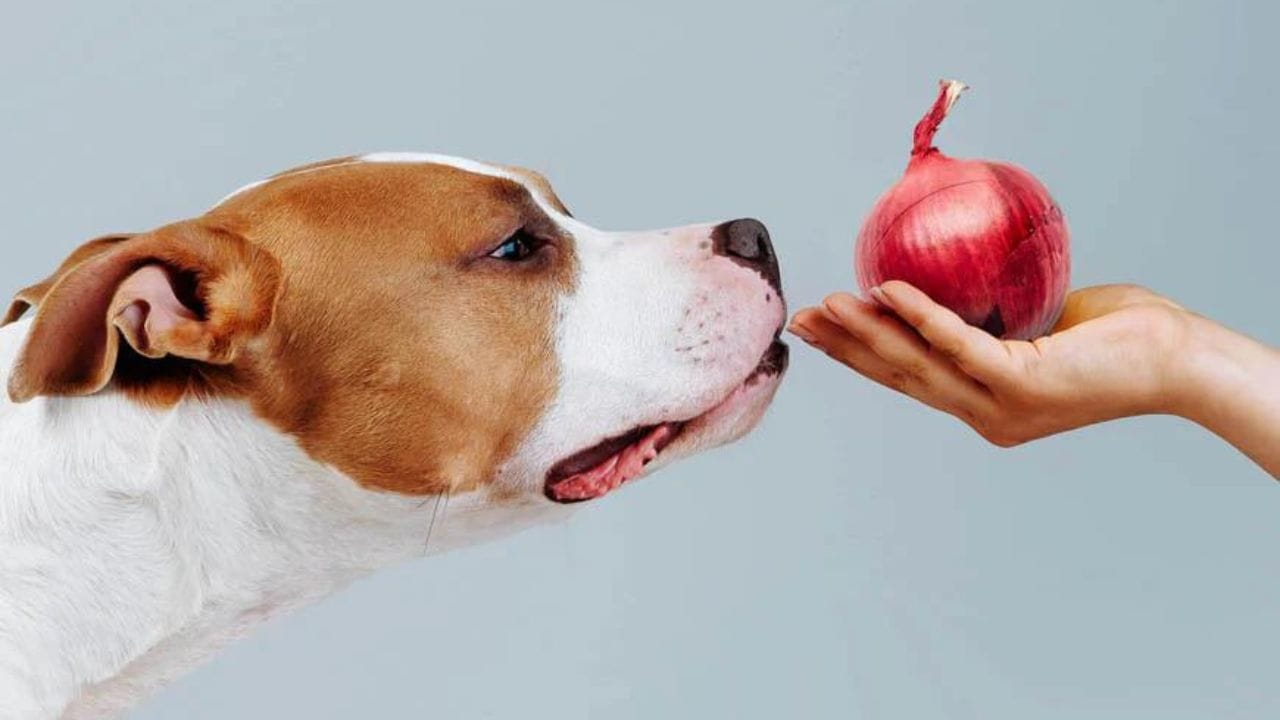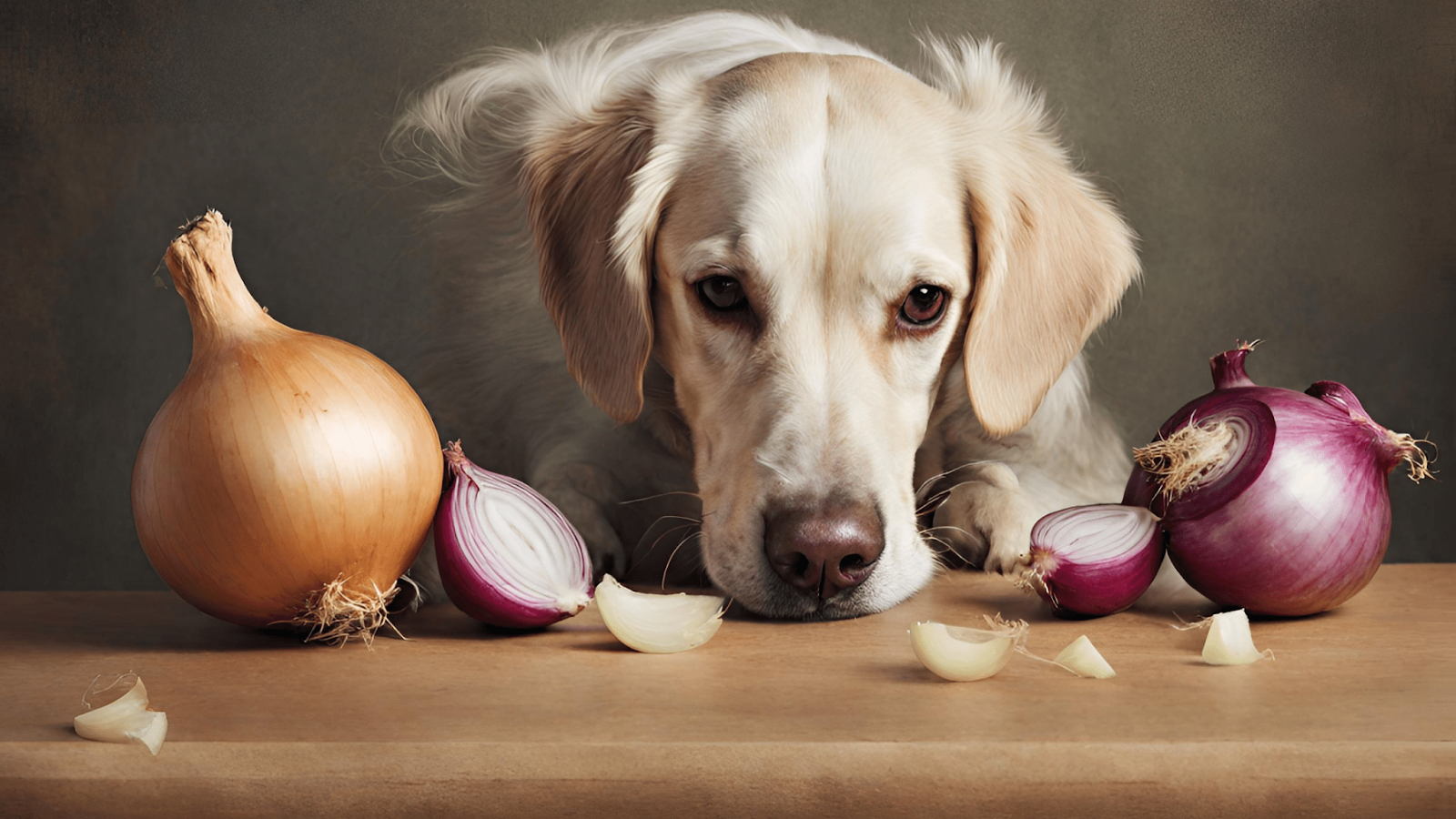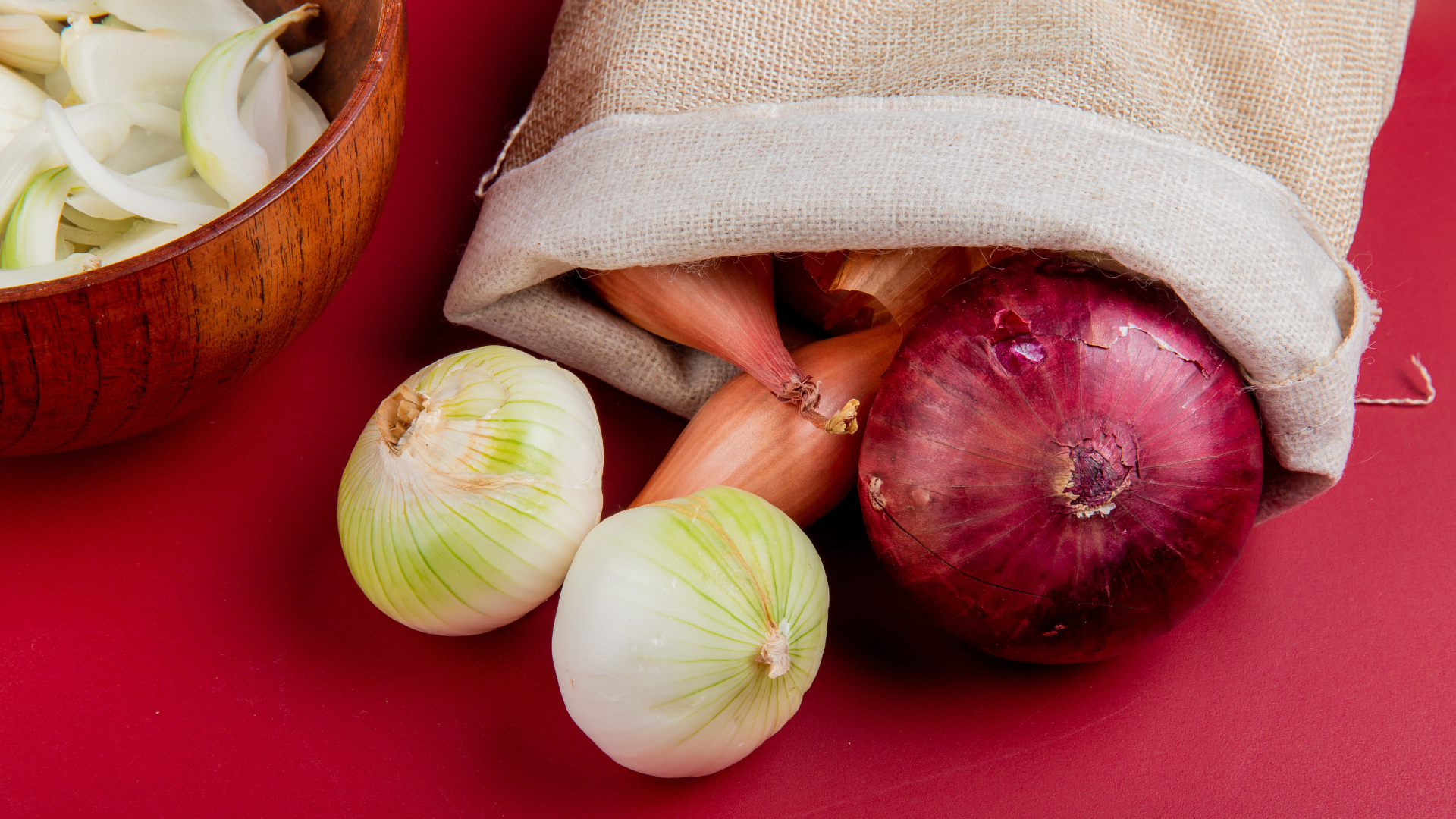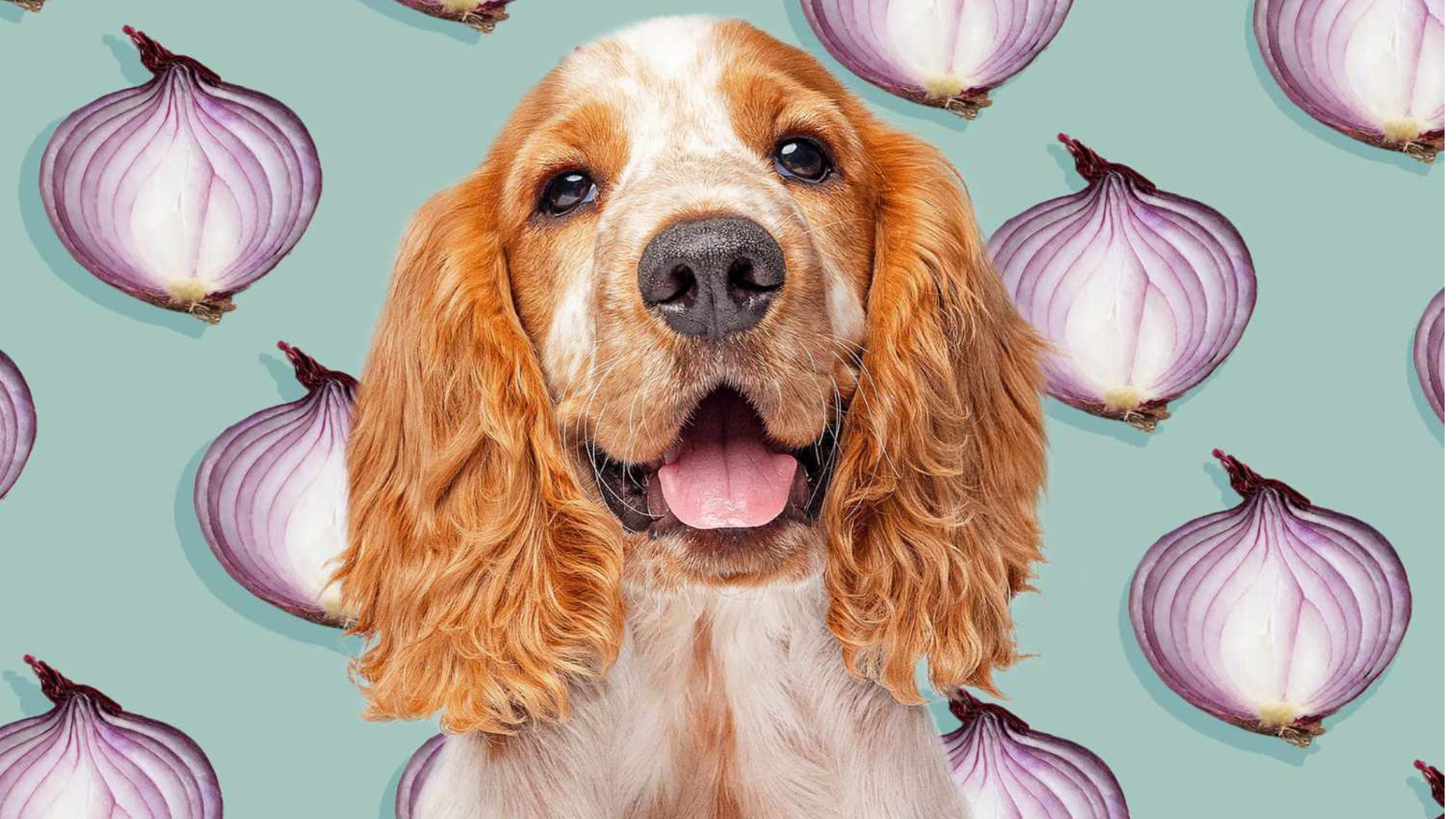Onions are a common ingredient in many human meals, but can dogs eat onions? This is a question that dog owners often ask, and the answer is no. Onions are toxic to dogs and can cause serious health problems.

Onions contain a compound called N-propyl disulfide, which can break down red blood cells in dogs and cause anemia. Symptoms of onion toxicity in dogs include vomiting, diarrhea, weakness, and difficulty breathing. In severe cases, onion toxicity can lead to organ damage and even death.
It's important for dog owners to be aware of the dangers of onions and to keep them away from their pets. Instead, they can offer their dogs a variety of healthy fruits and vegetables that are safe for them to eat. By being mindful of what their dogs consume, owners can help ensure their pet's health and well-being.
Toxicity of Onions to Dogs
Onions are a common ingredient in many human meals, but they are toxic to dogs. They contain a compound known as N-propyl disulfide, which can cause oxidative damage to a dog's red blood cells, leading to anemia and, in severe cases, death.
The toxic dose of onions for dogs is typically 15-30 grams per kilogram of the dog's weight, or about 0.5% of the body weight. Even a small amount of onion can cause gastrointestinal upset in dogs, which may include vomiting, diarrhea, or loss of appetite.
It's important to note that all parts of the onion plant are toxic to dogs, including the flesh, leaves, juice, and any processed forms of onions. This means that even if you remove the visible pieces of onion from your dog's food, there may still be traces of onion powder or flavoring that can be harmful to your furry friend.
If you suspect that your dog has ingested onions, it's crucial to seek veterinary attention immediately. The veterinarian may induce vomiting to remove the onions from the dog's stomach or administer medications to counteract the toxic effects of the onions.
In summary, onions are not safe for dogs to consume, and it's best to avoid feeding them to your furry friend altogether.
Symptoms of Onion Poisoning in Dogs
Onion poisoning in dogs can cause a variety of symptoms, which may vary in severity depending on the amount of onion consumed. The symptoms of onion poisoning in dogs can be divided into three categories: gastrointestinal, hematological, and respiratory symptoms.
Gastrointestinal Symptoms
Dogs that have ingested onions may experience gastrointestinal symptoms such as vomiting, diarrhea, and abdominal pain. The severity of these symptoms can vary depending on the amount of onion consumed. In some cases, dogs may also experience nausea and loss of appetite.
Hematological Symptoms
Onion poisoning can also cause hematological symptoms in dogs, which are related to the destruction of red blood cells. This can lead to anemia, which can cause lethargy, weakness, and pale gums. In severe cases, dogs may also experience jaundice, which is characterized by yellowing of the skin and eyes.
Respiratory Symptoms
In rare cases, onion poisoning in dogs can cause respiratory symptoms such as difficulty breathing and panting. This is usually a sign of severe anemia and requires immediate veterinary attention.
It is important to note that the severity of the symptoms of onion poisoning in dogs can vary depending on the amount of onion consumed, as well as the size and overall health of the dog. If you suspect that your dog has ingested onions, it is important to seek veterinary attention immediately to prevent serious complications.

Safe Foods for Dogs
When it comes to feeding your furry friend, it's important to know what foods are safe for them to eat. While dogs can eat a variety of human foods in moderation, there are some foods that should be avoided altogether. Here are some safe foods for dogs:
Lean Meats
Lean meats such as chicken, turkey, and beef are great sources of protein for dogs. They should be cooked thoroughly and without any seasoning. Avoid giving your dog fatty meats such as bacon or sausage, as these can cause stomach upset and even pancreatitis.
Fruits and Vegetables
Many fruits and vegetables are safe for dogs to eat, and can even provide some nutritional benefits. Some safe options include:
- Apples (without seeds)
- Bananas
- Blueberries
- Carrots
- Green beans
- Sweet potatoes
Be sure to remove any seeds, stems, or pits from fruits and vegetables before giving them to your dog.
Grains
Grains such as rice and oatmeal can be a good source of carbohydrates for dogs. They should be cooked and served plain, without any added salt or seasonings. Avoid giving your dog any grains that contain gluten, as some dogs can be sensitive to it.
Dairy
Dairy products such as cheese and yogurt can be safe for dogs in small amounts. However, some dogs may be lactose intolerant and experience stomach upset if they consume too much dairy. It's best to introduce dairy slowly and in small amounts to see how your dog reacts.
Remember, while these foods are generally safe for dogs to eat, it's important to always monitor your dog's diet and consult with your veterinarian if you have any concerns.

Treatment for Onion Poisoning
If you suspect that your dog has ingested onions, it's essential to seek veterinary help immediately. Onion poisoning can be fatal, especially without prompt treatment. In this section, we'll discuss the veterinary interventions and home care that can help to manage onion poisoning in dogs.
Veterinary Interventions
The veterinarian will likely begin by inducing vomiting to remove any remaining onion from the dog's stomach. They may also administer activated charcoal to prevent the absorption of any remaining toxins. In severe cases, the dog may need to be hospitalized for supportive care, including intravenous fluids to help flush the toxins from their system. The veterinarian may also perform blood transfusions to replace the damaged red blood cells.
Home Care
If the dog has mild onion poisoning, it may be possible to manage the condition at home. The dog should be kept quiet and comfortable and provided with plenty of fresh water to drink. The owner should monitor the dog's urine output and ensure that they are urinating regularly. If the dog's urine output decreases or they appear to be in pain, the owner should seek veterinary help immediately.
It's also essential to avoid feeding the dog any more onions or onion-containing foods. The owner should carefully read the labels of any commercial dog food or treats to ensure that they do not contain onion powder or other onion derivatives.
In summary, onion poisoning in dogs is a serious condition that requires prompt veterinary attention. With appropriate treatment and home care, most dogs will make a full recovery.
Prevention of Onion Toxicity

Safe Food Handling
To prevent onion toxicity in dogs, it is important to practice safe food handling techniques. This includes keeping onions and other Allium species, such as garlic and leeks, out of reach of dogs. It is also important to properly dispose of any onion scraps or waste in a secure trash can that is not accessible to dogs.
When cooking with onions, it is important to make sure they are cooked thoroughly. Raw or undercooked onions can be more toxic to dogs. If a dog accidentally consumes onions, it is important to seek veterinary care immediately.
Awareness and Education
Another way to prevent onion toxicity in dogs is through awareness and education. Dog owners should be educated on the dangers of onions and other Allium species. This includes understanding the symptoms of onion toxicity, such as vomiting, diarrhea, and weakness, and knowing when to seek veterinary care.
Dog owners should also be aware of the different forms in which onions can be found, such as onion powder and dehydrated onions, and avoid feeding them to their dogs. It is important to read ingredient labels carefully and avoid any products that contain onions or other Allium species.
By practicing safe food handling techniques and increasing awareness and education, dog owners can help prevent onion toxicity in their furry friends.
Alternative Foods for Dogs
While onions are not safe for dogs to consume, there are plenty of other human foods that can provide a healthy and enjoyable addition to their diet. Below are some alternative foods that are safe for dogs to eat in moderation:
1. Lean Meats
Lean meats such as chicken, turkey, and beef are excellent sources of protein for dogs. They are also rich in vitamins and minerals that are essential for maintaining a healthy body. However, it is important to avoid feeding dogs meat that is high in fat, as this can lead to weight gain and other health issues.
2. Fruits
Fruits such as apples, bananas, and blueberries are great sources of vitamins and antioxidants for dogs. They can also provide a sweet and tasty treat that dogs will love. However, it is important to remove any seeds or pits from the fruit before feeding it to your dog, as these can be harmful if ingested.
3. Vegetables
Vegetables such as carrots, green beans, and sweet potatoes are a great source of fiber and vitamins for dogs. They can also help to improve digestion and promote a healthy immune system. However, it is important to avoid feeding dogs vegetables that are high in starch, such as corn and potatoes, as these can cause digestive issues.
4. Dairy Products
Dairy products such as cheese and yogurt can provide a great source of calcium and protein for dogs. However, it is important to choose low-fat options, as dogs can have difficulty digesting high-fat dairy products.
By incorporating these alternative foods into your dog's diet, you can provide them with a healthy and enjoyable variety of foods while avoiding any harmful ingredients such as onions.
Understanding Dog Nutrition
Dogs require a balanced diet that provides them with all the necessary nutrients to maintain good health. This includes a combination of proteins, carbohydrates, fats, vitamins, and minerals. A well-balanced diet can help prevent various health problems in dogs, including obesity, diabetes, and heart disease.
Proteins are essential for building and repairing tissues in the body. They also help to maintain a healthy immune system. Good sources of protein for dogs include meat, fish, eggs, and dairy products.
Carbohydrates provide dogs with energy and help to maintain healthy digestion. Good sources of carbohydrates include grains, vegetables, and fruits.
Fats are an important source of energy for dogs and help to maintain healthy skin and coat. They also play a role in the absorption of certain vitamins. Good sources of fats for dogs include fish, poultry, and vegetable oils.
Vitamins and minerals are essential for maintaining good health and preventing disease. They play a role in many bodily functions, including the immune system, bone health, and vision. Good sources of vitamins and minerals for dogs include fruits, vegetables, and supplements.
It is important to note that not all human foods are safe for dogs to eat. Some foods, such as onions, can be toxic and cause serious health problems. Dogs should not be given onions in any form, including raw, cooked, or dehydrated. Onions contain a toxic compound called N-propyl disulfide, which can cause damage to red blood cells, leading to anemia in dogs. Symptoms of onion toxicity include vomiting, diarrhea, lethargy, and anemia.
In conclusion, understanding dog nutrition is essential for maintaining good health and preventing disease. Providing a well-balanced diet that includes all the necessary nutrients is key to keeping dogs healthy and happy. However, it is important to avoid feeding dogs foods that can be toxic, such as onions.
Conclusion
In conclusion, onions pose significant health risks to dogs, including anemia and potential organ damage due to their toxic compound N-propyl disulfide. It's imperative for dog owners to ensure their pets avoid onions in any form. Instead, offering safe and nutritious alternatives like lean meats, certain fruits, and vegetables can contribute to a balanced diet. Understanding dog nutrition is crucial for maintaining their health and preventing potential food-related issues. Always consult with a veterinarian for guidance on safe feeding practices and immediate care if onion ingestion occurs.




